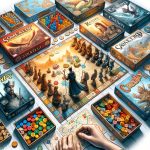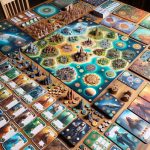Are you a fan of deep, challenging gameplay? Look no further than dense strategy board games. These games are known for their complex mechanics, intricate strategies, and deep thinking required to play. From classics like chess to modern favorites like Catan, these games offer a stimulating and intellectually rewarding experience for players.
Dense strategy board games have a rich history that spans centuries. From ancient civilizations to the present day, these games have captured the attention of people from all walks of life. Understanding the roots and evolution of dense strategy board games can provide insight into the timeless appeal of these captivating pastimes.
In this article, we will explore the key characteristics that define dense strategy board games, delve into the history of these games, highlight some popular titles worth trying, and discuss tips for mastering them. Whether you’re a seasoned player looking for your next challenge or a newcomer interested in diving into this world, there’s something for everyone in the realm of dense strategy board games.
The History of Dense Strategy Board Games
Dense strategy board games have a rich and fascinating history that dates back centuries. These games have been enjoyed by people of all ages, cultures, and backgrounds, often serving as a form of entertainment, education, and social interaction.
Early Origins
The roots of dense strategy board games can be traced back to ancient civilizations such as the Egyptians, Greeks, and Romans. Many of these early games focused on military tactics, resource management, and territorial conquest. One example is the game of Ludus Latrunculorum, a Roman game that involved strategic movement and capture of opponent’s pieces.
Medieval and Renaissance Period
During the medieval and Renaissance periods in Europe, dense strategy board games continued to evolve. Chess, considered one of the most classic dense strategy board games, emerged during this time. Chess incorporated complex rules, different unit movements, and strategic planning, reflecting the political and military intricacies of the time.
Modern Era
The 20th century saw an explosion in the popularity of dense strategy board games. Games like Risk (1957), Diplomacy (1959), and Civilization (1980) introduced new mechanics such as area control, negotiation, politics, and economic management. These modern dense strategy board games captivated players with their depth and complexity.
As we look back at the history of dense strategy board games, it’s clear that they have endured the test of time and continue to be beloved by enthusiasts worldwide for their intellectual challenge and entertainment value. Their evolution has led to a diverse array of games that cater to a wide range of interests and playing styles.
Key Characteristics of Dense Strategy Board Games
Dense strategy board games are known for their intricate gameplay and deep strategic thinking required to succeed. These games are not for the faint of heart, as they often involve complex rules, multiple decision-making points, and a high level of player engagement. Here are some key characteristics that set dense strategy board games apart from other types of tabletop games:
- Multi-layered Gameplay: Dense strategy board games often feature multiple layers of gameplay, where decisions made at one point can have far-reaching consequences later in the game. This adds depth and complexity to the overall experience.
- Strategic Depth: One of the defining characteristics of dense strategy board games is the need for deep strategic thinking. Players must carefully plan their moves several turns ahead, anticipate their opponents’ actions, and adapt their strategies based on changing game conditions.
- Resource Management: Many dense strategy board games involve resource management as a key gameplay element. Whether it’s managing resources such as currency, troops, or territory, players must make careful decisions about how to allocate and use their resources effectively.
Playing dense strategy board games can be incredibly rewarding for those who enjoy a mental challenge and tactical gameplay. Whether you’re a seasoned player or new to the genre, there is a wide variety of dense strategy board games to explore and master. So gather your friends or family, sharpen your wits, and delve into the world of dense strategy board games for an unforgettable gaming experience.
Popular Dense Strategy Board Games to Try
Are you looking for a new challenge in the world of board games? Look no further than dense strategy board games. These games are known for their complexity, depth, and tactics, making them a favorite among dedicated players. Whether you’re a seasoned gamer or just getting into the hobby, there’s a dense strategy board game out there for you.
If you’re ready to take your gaming experience to the next level, here are some popular dense strategy board games that you should consider trying:
1. Twilight Struggle: This game simulates the Cold War conflict between the United States and the Soviet Union. Players must use political influence, military operations, and special events to shape global history.
2. Terraforming Mars: In this game, players act as corporations working together to terraform the planet Mars by raising temperature, creating ocean areas, and cultivating green areas.
3. Gloomhaven: This cooperative game offers a deep and immersive experience where players take on the roles of wandering adventurers with their own special set of skills.
These are just a few examples of the many dense strategy board games available on the market. Each game offers its own unique challenges and rewards, so why not give one (or more) of them a try?
Keep in mind that these games may have intricate rules and mechanics, but don’t let that intimidate you. The satisfaction of mastering these complex games is well worth the effort. Whether you enjoy intense decision-making or immersive storytelling, dense strategy board games can provide hours of entertainment and mental stimulation. So gather your friends or family members and delve into the rich world of dense strategy board games today.
Tips for Mastering Dense Strategy Board Games
Dense strategy board games are not only challenging but also rewarding for those who are willing to put in the time and effort to master them. Whether you are a beginner looking to improve your skills or an experienced player aiming to take your game to the next level, there are several tips that can help you become a more formidable opponent in these complex and strategic games.
First and foremost, it is essential to familiarize yourself with the rules and mechanics of the specific dense strategy board game you are playing. Understanding the nuances of how the game works will provide you with a strong foundation upon which to build your strategies. Take the time to study the rulebook, watch tutorial videos, or even play practice rounds to grasp the intricacies of the game.
In addition to knowing the rules, it is crucial to develop a deep understanding of various strategies and tactics that can be employed during gameplay. This may involve analyzing optimal opening moves, understanding resource management, assessing risk versus reward scenarios, and anticipating your opponents’ potential actions. By honing your strategic thinking and decision-making abilities, you can increase your chances of success in dense strategy board games.
Furthermore, practicing regularly is indispensable for mastering dense strategy board games. As with any skill, continuous practice allows you to refine your techniques, learn from your mistakes, and adapt your strategies based on different situations that may arise during gameplay. Whether it’s playing against friends, joining local gaming groups, or utilizing online platforms for virtual matches, consistent practice will undoubtedly enhance your skills and overall proficiency in these intellectually stimulating games.
By following these tips and dedicating yourself to learning and improving, you can elevate your gameplay in dense strategy board games and derive greater enjoyment from the intricate challenges they offer. Mastering these games requires patience, dedication, and strategic acumen – but the sense of accomplishment that comes with outmaneuvering opponents through careful planning makes it all worthwhile.
The Benefits of Playing Dense Strategy Board Games
Dense strategy board games offer a multitude of benefits for those who enjoy challenging themselves with complex and strategic gameplay. These benefits go beyond mere entertainment and can have a positive impact on cognitive skills, social interaction, and overall well-being. Whether it’s enhancing critical thinking abilities or fostering camaraderie among players, dense strategy board games have much to offer.
Cognitive Development
One of the primary benefits of playing dense strategy board games is the cognitive development that occurs during gameplay. These games often require players to think critically, plan ahead, and analyze various scenarios. As a result, individuals can improve their problem-solving skills, enhance their memory retention, and develop strategic thinking abilities that can be applied in other areas of life.
Social Interaction
In addition to cognitive benefits, dense strategy board games also provide opportunities for social interaction. Playing these types of games encourages communication, teamwork, and friendly competition among participants. This can strengthen relationships, build trust, and create lasting bonds between friends and family members.
Stress Reduction
Furthermore, engaging in dense strategy board games can serve as a form of stress reduction. Immersing oneself in the complexities of these games allows for a temporary escape from everyday worries and responsibilities. The mental stimulation provided by strategic gameplay can also lead to feelings of accomplishment and satisfaction as players overcome challenges and achieve their objectives. Overall, playing dense strategy board games can contribute to an improved sense of well-being.
How to Choose the Right Dense Strategy Board Game for You
When choosing the right dense strategy board game for you, there are several factors to consider. One of the first things to think about is the complexity of the game. Some dense strategy board games can be quite complicated, with numerous rules and mechanics to learn and master. If you’re new to this type of game, you may want to start with something a bit simpler before diving into more complex titles.
Another important factor to consider is the theme of the game. Dense strategy board games come in a wide variety of themes, from historical warfare to futuristic sci-fi settings. Choose a theme that you find intriguing and engaging, as this will make the learning process more enjoyable.
It’s also crucial to think about who you will be playing the game with. Some dense strategy board games are designed for 2 players, while others are better suited for larger groups. Consider your typical gaming group and choose a game that fits the number of players you usually have.
When choosing a dense strategy board game, it’s also worth considering the length of time it takes to play. Some games can be completed in under an hour, while others may take several hours or even multiple sessions to finish. Think about how much time you typically have available for gaming and choose a game that fits your schedule.
| Factors to Consider | Considerations |
|---|---|
| Complexity | Start with simpler games if new; dive into more complex ones later |
| Theme | Choose a theme that is intriguing and engaging |
| Number of Players | Consider your typical gaming group and choose a suitable player count |
| Length of Time | Choose a game that fits your available time for gaming |
The Future of Dense Strategy Board Games
In conclusion, the future of dense strategy board games looks bright, with several exciting trends and innovations on the horizon. As these games continue to grow in popularity, we can expect to see even more diverse themes and settings, catering to a broader range of interests. Additionally, advancements in game design and components will likely enhance the overall gaming experience, making for more immersive and engaging gameplay.
One trend that is expected to continue shaping the future of dense strategy board games is the integration of technology. With the rise of digital tabletop platforms and companion apps, players can look forward to a seamless blend of physical and digital elements in their gaming experiences. This will not only provide new ways to interact with the game but also open up opportunities for unique mechanics and storytelling techniques.
Furthermore, as the community of dense strategy board game enthusiasts continues to grow, we anticipate an increase in collaborative and competitive gaming events. Whether it’s through organized tournaments or casual meetups, these gatherings offer players a chance to connect with like-minded individuals, share strategies, and celebrate their love for these intellectually stimulating games. With so much innovation on the horizon, it’s indeed an exciting time for fans of dense strategy board games.
Frequently Asked Questions
What Is the Most Strategic Board Game?
The most strategic board game is often considered to be chess. It requires players to think several moves ahead, anticipate their opponent’s strategies, and adapt to changing game conditions. Chess involves a high level of strategic thinking and planning.
What’s the Most Complex Board Game?
The most complex board game is commonly considered to be Go. With a larger board and more possible moves than chess, Go presents a vast number of strategic possibilities. Mastering the intricacies of this ancient game can take years of practice and study.
What Is the Most Skillful Board Game?
The most skillful board game may be debated, but many consider games like Scrabble or Settlers of Catan to require a high level of skill. In Scrabble, players must have a strong vocabulary and tactical word-placement abilities, while Settlers of Catan demands resource management, negotiation skills, and long-term planning to succeed.
Both games reward skillful decision-making and strategic thinking.

I love playing all kinds of games – from classics like Monopoly to modern favourites like Ticket to Ride.
I created this blog as a way to share my love of board games with others, and provide information on the latest releases and news in the industry.





